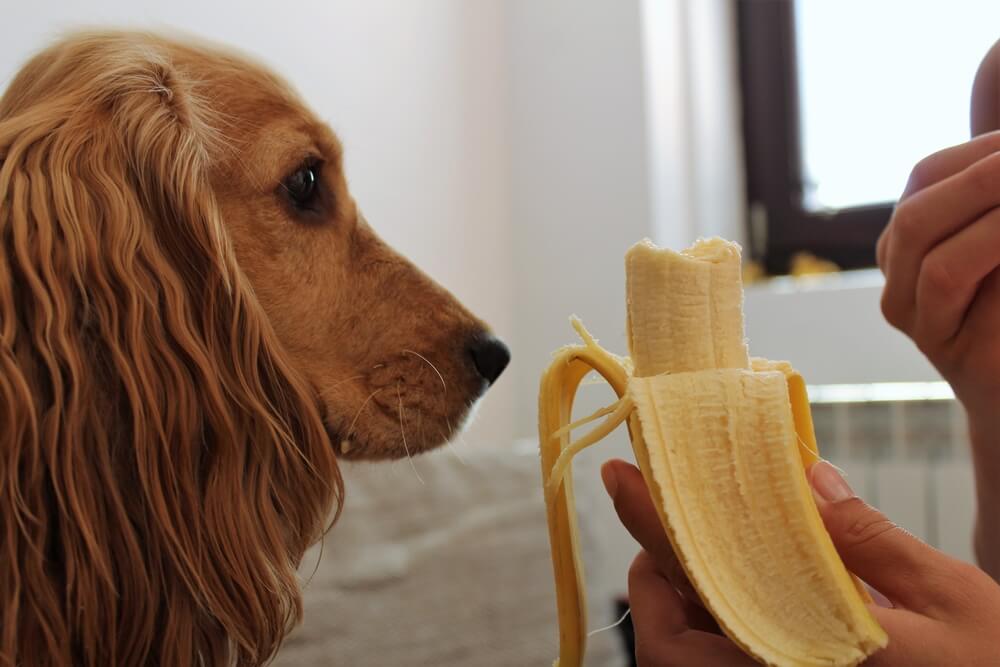
DogFoodAdvisor is reader supported See how
Dog Food Advisor is 100% impartial and is never paid to promote any brand. But if you buy using links on this page, we may earn a referral fee.
Is it safe for dogs to eat bananas?
Convenient, sweet, filling, and healthy, bananas are a favorite fruit for many of us. But what about those eager eyes watching you peel the yellow fruit – can dogs eat bananas?
As we’ve discussed before, some human foods such as garlic and chocolate are strictly off-limits for dogs, while others like peanut butter, pork, and dairy fall into a grey area. So, it’s natural for pet parents to wonder if bananas are safe for dogs.
Good news though — dogs can eat bananas! But, like all fruit, moderation is key. In small amounts, bananas make a great low-calorie treat. They can even be a tasty soother for teething puppies when frozen.
However, there are some precautions to keep in mind. In this article, we’ll cover everything you need to know about feeding bananas to your dog, including banana chips, peels, and ripeness.
Are bananas healthy for dogs?
Bananas contain a variety of vitamins and minerals such as fiber, vitamins C and B6, potassium, magnesium, and biotin. However your dog is only recommended to eat small doses of the fruit so they’re unlikely to reap these health benefits.
Sure, bananas aren’t toxic but they aren’t necessarily healthy for dogs either. Your dog should be receiving all nutrients, including potassium, from their food so supplementing bananas isn’t required for a balanced diet.
How many bananas can a dog eat?
If your dog gobbles a banana whole, they should be ok. However, bananas are high in natural sugar, so too much of it can put your dog at risk of putting on weight and developing medical conditions such as obesity or diabetes.
The fruit also contains high levels of potassium which can cause stomach upset, like dog diarrhea or vomiting. However, if you include the fruit as part of your dog’s daily calorie intake, bananas can be a safe, healthy treat option.
Can dogs be allergic to bananas?
Yes, it’s possible for dogs to be allergic to bananas, although it’s not very common. Allergic reactions can vary from mild to severe and may include symptoms such as itching, swelling, digestive upset, or respiratory issues.
If you’re introducing bananas to your dog’s diet for the first time, start with a small amount and monitor for any signs of an adverse reaction. If your dog shows any signs of discomfort or if you suspect an allergy, it’s best to consult with your veterinarian. They can provide guidance on whether bananas are suitable for your dog and can help identify any potential allergies.
Can dogs eat banana peels?
It’s better to feed your dog a peeled banana. While banana peels aren’t toxic like orange peels, they can cause digestive upset. Similar to humans, dogs aren’t accustomed to the high fiber content in peels, which can lead to diarrhea.
Can dogs eat dried bananas?
Dried bananas (banana chips) can be a tasty, healthy snack for your dog. However, most commercially available banana chips contain high sugar levels and added preservatives.
So, if you want to offer your dog dried bananas as a treat, it’s recommended to dehydrate the bananas yourself using either a dehydrator or your oven.
Cooking bananas can make them easier for dogs to digest, and some dogs find them tastier.
Can dogs eat bananas every day?
The number of bananas you can feed your dog depends on their size, overall health, and dietary needs. As a general guideline:
Small dogs: A few small pieces or slices of banana are usually sufficient. It’s important not to exceed 1-2 teaspoons of banana per day for very small dogs.
Medium-sized dogs: If we haven’t mentioned it enough, moderation is still key. You can offer a half to one whole small banana or a few slices per day.
Large dogs: Larger dogs can typically consume a whole banana or larger portions, but it’s crucial to monitor their overall diet and ensure that treats, including bananas, do not exceed 10% of their daily caloric intake.
So, yes they generally can eat small portions daily but within reason and it always varies with different dogs.
Can dogs eat frozen bananas?
Yes, dogs can enjoy frozen bananas as a refreshing treat, especially on hot days. Frozen bananas can provide a soothing texture for teething puppies or a cooling snack for adult dogs.
Simply cut the banana into small, manageable pieces before freezing to prevent choking hazards. Avoid giving large frozen chunks that could be difficult for your dog to chew.
Can dogs eat green bananas?
Green, unripe bananas are not ideal for dogs. They contain higher levels of resistant starch, which can be difficult for dogs to digest and may cause gastrointestinal discomfort. It’s best to wait until the bananas are fully ripe before offering them to your dog.
Can dogs eat ripe bananas?
Ripe bananas are the best option for dogs. They are easier to digest and more palatable. As always, remove the peel and cut the banana into small pieces to avoid choking hazards.
How to feed your dog banana
In addition to giving your dog a piece of a regular banana, here are some other ways they can enjoy the tasty snack:
- Mash it up with their food
- Mix it into a little dog-safe peanut butter
- Put the banana into a stuffable dog toy and freeze it
- Freeze the whole banana, peel it, and slice it
Final word
The Dog Food Advisor does not accept money, gifts, samples or other incentives in exchange for special consideration in preparing our reviews.
However, we do receive a referral fee from online retailers (like Chewy or Amazon) and from sellers of perishable pet food when readers click over to their websites from ours. This helps cover the cost of operation of our free blog. Thanks for your support.
For more information, please visit our Disclaimer and Disclosure page.
Article reviewed by
Laura Ward
Pet Nutritionist
Laura studied BSc (Hons) Animal Science with an accreditation in Nutrition at the University of Nottingham, before working for eight years in the pet food and nutrition industry.




